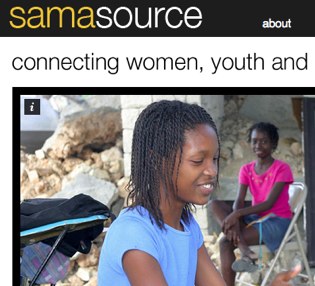 San Francisco based Samasource is on a mission to help women, refugees and young people in developing countries earn a living wage on the Internet. The model is straightforward – Samasource works with companies that need certain types of relatively simple tasks done, like database cleanup, translations, transcriptions, etc. Samasource charges companies on a per action basis, and then pays workers in Kenya, Uganda, India, Pakistan and Haiti to do the work.
San Francisco based Samasource is on a mission to help women, refugees and young people in developing countries earn a living wage on the Internet. The model is straightforward – Samasource works with companies that need certain types of relatively simple tasks done, like database cleanup, translations, transcriptions, etc. Samasource charges companies on a per action basis, and then pays workers in Kenya, Uganda, India, Pakistan and Haiti to do the work.
The tasks are generally more complicated than Mechanical Turk stuff, and the company pays a minimum of $1/hour to workers who were previously living on less than $3/day. Some workers, who build up to more complex tasks, make as much as $10/hour.
And what’s more important is that these workers develop a long term relationship with Samasource. They work via local companies that organize and hire the workers and do quality control, and that model seems to work. Today the company has 800 workers in various countries and wants to scale that up significantly. CEO Leila Janah says there is an infinite amount of labor available at a few dollars per hour, and that these jobs make a huge difference in the lives of the workers. There are 4 billion people living on less than $3/day, she says, and $1.4 billion living on less than $1/day.
They are building slowly because they don’t want to lay people off if there’s no work, so part of their job is to find long term customers with a steady work flow. They recently signed a $450,000 contract with a new customer that will allow them to hire another 200 or so workers, for example. To date Samasource has made $1.2 million in gross revenue, and all but 15% or so of that was distributed to workers.
Samasource is, like Kiva, a non profit organization. What this company really needs is to get a large government or other grant to try to scale their work. A large part of Janah’s time seems to be spent on chasing that money, and a few million dollars as a grant would go a long way to providing thousands of people with work. Or, Samasource could turn into a for-profit entity and raise more traditional venture capital for growth. But that would limit a lot of the goodwill the entity now receives as a full fledged non profit. We discuss all of that in our interview. And we also discover that Janah believes in her company so much that she had it tattooed onto her wrist.
I actually didn’t know much about Samasource before meeting Leila last weekend at Foo Camp. But we’re already likely to become customers – we have a huge need for data massaging on Crunchbase as well as transcriptions for TechCrunchTV.
The interview is below (the tattoo is at the end, if that’s all you want to see):